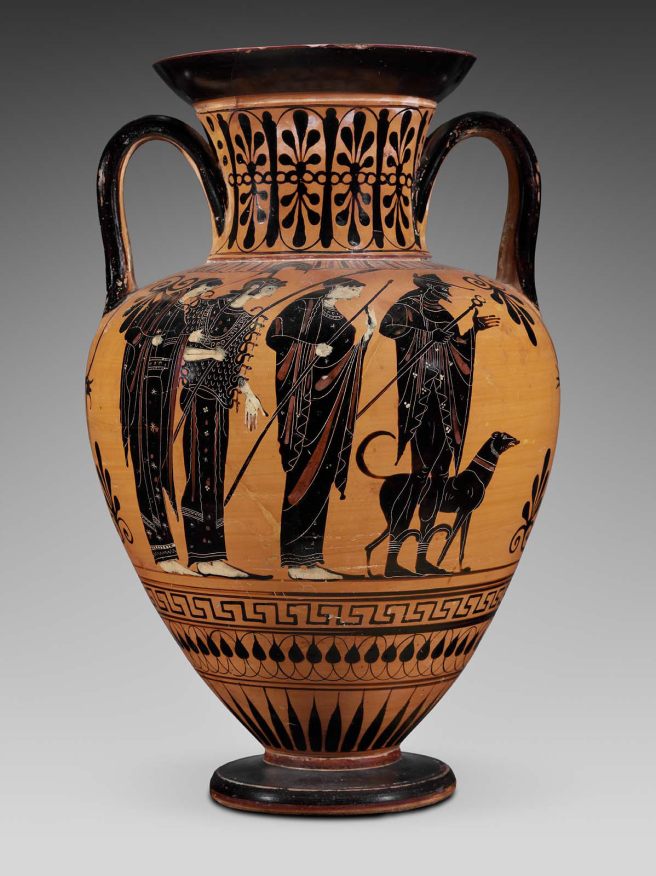Crapulous: def. 2: Sick from excessive indulgence in liquor.

From the Suda:
“Kraipalê: The pounding that comes from drinking too much wine. We also have the participle “carousing” which is when someone acts poorly because of drinking, or just being drunk. It derives from the word “head” (kara) and “pound” (pallein). Or, it could also come from screwing up (sphallesthai) timely matters (kairiôn)
Κραιπάλη: ὁ ἐκ πολλῆς οἰνώσεως παλμός. καὶ Κραιπαλῶν, ἀντὶ τοῦ ἐκ μέθης ἀτακτοῦντα, μεθύοντα. ἀπὸ τοῦ κάρα πάλλειν τοὺς μεθύοντας. ἢ ἀπὸ τοῦ σφάλλεσθαι τῶν καιρίων.
Kraipalôdês: “Prone to drunkenness”: The ancients knew well the weaknesses of the spirit, weather it was a person who was prone to excessive drinking or a love-seeker who has his brain in his genitals.”
Κραιπαλώδης· τῆς ψυχῆς τὰ ἐλαττώματα κατηπίσταντο, εἴτε κραιπαλώδης τις εἴη καὶ μέθυσος εἴτε φιλήδονος καὶ ἐν τοῖς αἰδοίοις ἔχων τὸν ἐγκέφαλον.
Kraipalaikômos: “Hangover-revel”: Metonymically, this a song that happens while drunk
Κραιπαλαίκωμος: μετωνυμικῶς ὁ κατὰ μέθην γινόμενος ὕμνος.

Alexis, fr. 287
“Yesterday you drank too much and now you’re hungover.
Take a nap—this will help it. Then let someone give you
Cabbage, boiled.”
ἐχθὲς ὑπέπινες, εἶτα νυνὶ κραιπαλᾷς.
κατανύστασον· παύσῃ γάρ. εἶτά σοι δότω
ῥάφανόν τις ἑφθήν.
Eubulus, fr. 124
“Woman, it’s because you think I am a cabbage that you’re trying
To give me your hangover. At least, that’s how it seems to me.”
γύναι,
ῥάφανόν με νομίσασ’ εἰς ἐμέ σου τὴν κραιπάλην
μέλλεις ἀφεῖναι πᾶσαν, ὡς ἐμοὶ δοκεῖς.
Nikokharês
“Tomorrow we will boil acorns instead of cabbage
To treat our hangover.”
εἰσαύριον .. ἀντὶ ῥαφάνων ἑψήσομεν
βαλάνιον, ἵνα νῷν ἐξάγῃ τὴν κραιπάλην.
Alexis, fr. 390
“If only we got hangovers before we drank
Then no one would ever drink more
Than is good for them. But now, because
We do not expect to escape drinking’s penalty,
We too eagerly drink unmixed wines”
εἰ τοῦ μεθύσκεσθαι πρότερον τὸ κραιπαλᾶν
παρεγίνεθ’ ἡμῖν, οὐδ’ ἂν εἷς οἶνόν ποτε
προσίετο πλείω τοῦ μετρίου. νυνὶ δὲ τὴν
τιμωρίαν οὐ προσδοκῶντες τῆς μέθης
ἥξειν προχείρως τοὺς ἀκράτους πίνομεν.
Sopater
“It is sweet for men to drink at dawn
Streams of honey when they are struck by thirst
Driven by the last night’s hangover”
νᾶμα μελισσῶν ἡδὺ μὲν ὄρθρου
καταβαυκαλίσαι τοῖς ὑπὸ πολλῆς
κραιπαλοβόσκου δίψης κατόχοις.
How to Cure a Hangover…
Aristotle, Problemata 873a-b
“Wine (being of a wet nature) stretches those who are slow and makes them quick, but it tends to restrain those who are quick already. On that account, some who are melancholic by nature become entirely dissipated in drunken stupors (kraipalais). Just as a bath can make those who are all bound up and stiff more readily able to move, so does it check those who are already movable and loose, so too does wine, which is like a bath for your innards, accomplish this same thing.
Why then does cabbage prevent drunkenness (kraipale)? Either because it has a sweet and purgative juice (and for this reason doctors use it to clean out the intestines), even though it is itself of a cold nature. Here is a proof: doctors use it against exceptionally bad cases of diarrhea, after preparing it by cooking it, removing the fiber, and freezing it. It happens in the case of those suffering from the effects of drunkenness (kraipalonton) that the cabbage juice draws the wet elements, which are full of wine and still undigested, down to their stomachs, while the body chills the rest which remains in the upper part of the stomach. Once it has been chilled, the rest of the moist element can be drawn into the bladder. Thus, when each of the wet elements has been separated through the body and chilled, people are likely to be relieved of their drunkenness (akraipaloi). For wine is wet and warm.”
καὶ ὁ οἶνος (ὑγρὸς γάρ ἐστι τὴν φύσιν) τοὺς μὲν βραδυτέρους ἐπιτείνει καὶ θάττους ποιεῖ, τοὺς δὲ θάττους ἐκλύει. διὸ ἔνιοι τῶν μελαγχολικῶν τῇ φύσει ἐν ταῖς κραιπάλαις ἐκλελυμένοι γίνονται πάμπαν. ὥσπερ γὰρ τὸ λουτρὸν τοὺς μὲν συνδεδεμένους τὸ σῶμα καὶ σκληροὺς εὐκινήτους ποιεῖ, τοὺς δὲ εὐκινήτους καὶ ὑγροὺς ἐκλύει, οὕτως ὁ οἶνος, ὥσπερ λούων τὰ ἐντός, ἀπεργάζεται τοῦτο.
Διὰ τί ἡ κράμβη παύει τὴν κραιπάλην; ἢ ὅτι τὸν μὲν χυλὸν γλυκὺν καὶ ῥυπτικὸν ἔχει (διὸ καὶ κλύζουσιν αὐτῷ τὴν κοιλίαν οἱ ἰατροί), αὐτὴ δ’ ἐστὶ ψυχρά. σημεῖον δέ· πρὸς γὰρ τὰς σφοδρὰς διαρροίας χρῶνται αὐτῇ οἱ ἰατροί, ἕψοντες σφόδρα καὶ ἀποξυλίζοντες καὶ ψύχοντες. συμβαίνει δὴ τῶν κραιπαλώντων τὸν μὲν χυλὸν αὐτῆς εἰς τὴν κοιλίαν κατασπᾶν τὰ ἐν αὐτοῖς ὑγρά, οἰνηρὰ καὶ ἄπεπτα ὄντα, αὐτὴν δὲ ὑπολειπομένην ἐν τῇ ἄνω κοιλίᾳ ψύχειν τὸ σῶμα. ψυχομένου δὲ ὑγρὰ λεπτὰ συμβαίνει εἰς τὴν κύστιν φέρεσθαι. ὥστε κατ’ ἀμφότερα τῶν ὑγρῶν ἐκκρινομένων διὰ τοῦ σώματος, καὶ καταψυχομένου, εἰκότως ἀκραίπαλοι γίνονται· ὁ γὰρ οἶνος ὑγρὸς καὶ θερμός ἐστιν.
Hippocrates of Cos, Epidemics 2.30
“If someone has head pain from a hangover, have him drink a cup of unmixed wine. For different head pains, have the patient eat bread warm from unmixed wine.”
Ἢν ἐκ κραιπάλης κεφαλὴν ἀλγέῃ, οἴνου ἀκρήτου κοτύλην πιεῖν· ἢν δὲ ἄλλως κεφαλὴν ἀλγέῃ, ἄρτον ὡς θερμότατον ἐξ οἴνου ἀκρήτου ἐσθίειν.
Plutarch, Table-Talk 3 (652F)
“Those who are suffering bodily from drinking and being hungover can find relief from sleeping immediately, warmed with a cover. On the next day, they can be restored with a bath, a massage, and whatever food does not cause agitation but restores the warmth dispelled and lost from the body by wine.”
ἰῶνταί γε μὴν τὰς περὶ τὸ σῶμα τῶν μεθυσκομένων καὶ κραιπαλώντων κακώσεις εὐθὺς μὲν ὡς ἔοικε περιστολῇ καὶ κατακλίσει συνθάλποντες, μεθ᾿ ἡμέραν δὲ λουτρῷ καὶ ἀλείμματι καὶ σιτίοις, ὅσα μὴ ταράττοντα τὸν ὄγχον ἅμα πράως ἀνακαλεῖται τὸ θερμὸν ὑπὸ τοῦ οἴνου διεσπασμένον καὶ πεφυγαδευμένον ἐκ τοῦ σώματος.
Latin: crapula, from Grk. Kraipalê
Plautus, Rudens 585-590
“But why am I standing here, a sweating fool?
Maybe I should leave here for Venus’ temple to sleep off this hangover
I got because I drank more than I intended?
Neptune soaked us with the sea as if we were Greek wines
And he hoped to relieve us with salty-beverages.
Shit. What good are words?”
sed quid ego hic asto infelix uuidus?
quin abeo huc in Veneris fanum, ut edormiscam hanc crapulam,
quam potaui praeter animi quam lubuit sententiam?
quasi uinis Graecis Neptunus nobis suffudit mare,
itaque aluom prodi sperauit nobis salsis poculis;
quid opust uerbis?

Plautus, Stichus 226-230
“I am selling Greek moisturizers
And other ointments, hangover-cures
Little jokes, blandishments
And a sycophant’s confabulations.
I’ve got a rusting strigil, a reddish flask,
And a hollowed out follower to hide your trash in.”
uel unctiones Graecas sudatorias
uendo uel alias malacas, crapularias;
cauillationes, assentatiunculas,
ac periuratiunculas parasiticas;
robiginosam strigilim, ampullam rubidam,
parasitum inanem quo recondas reliquias.
Advice more useful the day before
John of Damascus, Sacra Parallela 96.161:
“When the membranes become full of the vapors which wine produces when it is vaporized, the head is stricken with unbearable pains. No longer can it stay upright upon the shoulders, but it constantly drops this way and that, slipping around upon its joints. But who would say such things to those stricken by wine? Their heads are heavy from drunkenness (kraipale), they nod off, they yawn, they see through a fog, and they feel nauseous. On that account, they do not listen to their teachers yelling out to them all of the time. Don’t get drunk on wine, in which there is profligacy. Therein lie trembling and weakness, the breath is beaten out by immoderate indulgence in wine, the nerves are slackened, and the entire mass of the body is put into disorder. “

῞Οταν γὰρ πλήρεις αἱ μένιγγες γίνωνται τῆς αἰθάλης, ἣν ὁ οἶνος ἐξατμιζόμενος ἀναφέρει, βάλλεται μὲν ὀδύναις ἀφορήτοις ἡ κεφαλή· μένειν δὲ ὀρθὴ ἐπὶ τῶν ὤμων μὴ δυναμένη, ἄλλοτε ἐπ’ ἄλληλα καταπίπτει, τοῖς σπονδύλοις ἐνολισθαίνουσα. ᾿Αλλὰ τίς εἴποι ταῦτα τοῖς οἰνοπλήκτοις; καρηβαροῦσι γὰρ ἐκ τῆς κραιπάλης, νυστάζουσι, χασμῶνται, ἀχλὺν βλέπουσιν, ναυτιῶσιν. Διὰ τοῦτο οὐκ ἀκούουσι τῶν διδασκάλων πολλαχόθεν αὐτοῖς ἐκβοώντων· Μὴ μεθύσκεσθε οἴνῳ, ἐν ᾧ ἐστιν ἀσωτία. ᾿Εντεῦθεν οἱ τρόμοι καὶ αἱ ἀσθένειαι, κοπτομένου αὐτοῖς τοῦ πνεύματος ὑπὸ τῆς ἀμετρίας τοῦ οἴνου, καὶ τῶν νεύρων λυομένων, ὁ κλόνος τῷ σύμπαντι ὄγκῳ τοῦ σώματος ἐπιγίνεται.
Like this:
Like Loading...


















